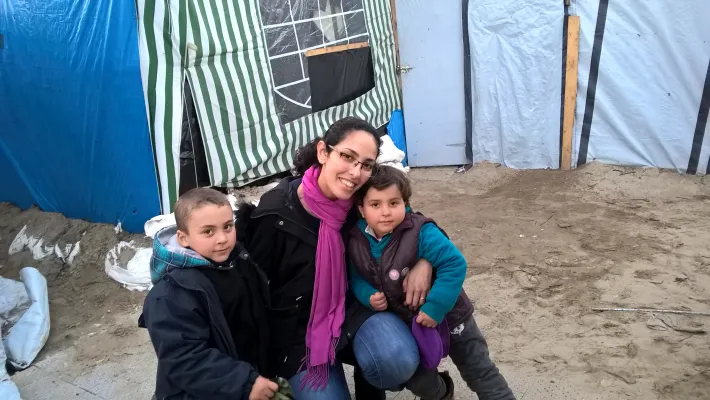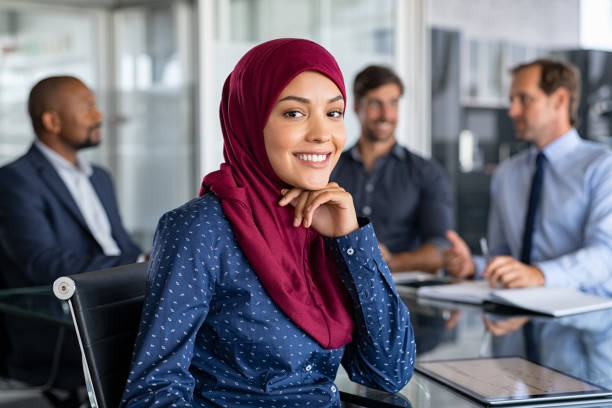When contemplating humanitarian charities, it is customary for most people to sympathise with what they have been conditioned to see; a traditional list of vulnerabilities that begins, and often ends with women and children in need of protection from exploitation, as well as assistance to survive during difficult times.
This becomes particularly relevant during challenging economic periods, in the aftermath of a global pandemic, and ongoing political conflicts that leave behind the scars of war and forced displacement.
I invite you to delve deeper into this matter. Who, in your view, is better positioned to lead humanitarian projects aimed at supporting these vulnerable groups, especially women and children, than a woman equipped with the requisite skills?

However, it seems on the most part, that beyond general discussions and support for lower-level roles women are not at the forefront of leadership roles in the charity sector – especially in the Muslim charity sector.
A 2019 survey conducted by Charity Finance reveals that ‘almost 70 percent of chief executives at the largest charities in the country are men.’. This disparity becomes even more evident when examining the UK Muslim charity sector, where it has been documented that ‘none of the top UK Muslim charities are led by women.’
A quote from the Quran reads, ‘Men will be rewarded according to their deeds and women equally according to theirs. Rather, ask Allah for His bounties. Surely Allah has perfect knowledge of all things” (Surah An-Nisa 4:32), the verse in the Quran is clear.
We have all heard the saying, ‘it’s a man’s world’ and in developing countries this sentiment often becomes even more apparent due to cultural constraints. Women leaders such as myself are often viewed through the lens of a ‘third-world culture’ and the achievements of UK Muslim charity CEOs are not necessarily based on their merit. Empathy and lived experience of unconscious bias in a female Muslim leader’s life empowers her with the tools needed to lend an empathic point of view.
It is likely she who can gracefully navigate the intricacies of culture, religion, and societal nuances, bringing forth a transformative impact while upholding the values of compassion and solidarity, and is fully capable of leading Muslim teams of both genders.
Empathy and lived experience of unconscious bias in a female Muslim leader’s life empowers her with the tools necessary to lend an empathic point of view, and it is likely she who can gracefully navigate the intricacies of culture, religion, and societal nuances, bringing forth a transformative impact while upholding the values of compassion and solidarity, and is fully capable of leading Muslim teams of both genders.
Eight years ago, while I was juggling patient reports and other responsibilities as a mother, I saw a harrowing report on the evening news about the heart-wrenching disappearance of 165 unaccompanied children in the Calais Jungle. What was once an old military base used to train 2000 soldiers has since turned into a wasteland of muddy dishevelled tents containing over 10,000 forcibly displaced people from all over the world with little to no security.
Unable to ignore the profound pain and suffering etched into the eyes of mothers who had lost their children, I felt an irresistible calling within me. It became an indelible catalyst, urging me to leave behind the familiar confines of my long-standing role as a Cognitive Behavioural Practitioner in the NHS, along with the pause of my Ph.D. aspirations in the field of neuroscience.
Driven by an unwavering determination, I founded a non-profit humanitarian organisation called Goodwill Caravan and later registered it in the United Kingdom and as an NGO in Greece – one of the main geographic ports of entry for refugees fleeing wars and persecution into Europe.
Since that transformative moment, I have shouldered both the privilege and the weight of bearing witness to the plight of refugee women whose resilient souls we labour to assist and protect. It pains me to see them ensnared in a web of unfortunate circumstances largely stemming from a lack of support to facilitate their integration into a new life. Compounded by an alarming lack of reliable information available to them, these vulnerable individuals find themselves at an elevated risk of exploitation.
Our exhaustive surveys have revealed a sobering truth that while donors often feel gratified by contributing towards tangible items such as food packs, blankets, and shelters there exists a crucial commodity that remains distressingly scarce for refugees. It is the dire need for reliable and up-to-date information encompassing access to legal support, medical assistance, employment opportunities, and education to name but a few. Refugees and asylum seekers are unequivocally entitled to receive accurate and pertinent information, a belief shared by the signatories of the U.N. 1951 Refugee Convention.
Through my work at Goodwill Caravan, I have witnessed the immense challenges concerning female beneficiaries in developing countries. These obstacles often arise from limited access to education, healthcare, economic opportunities, and the pervasive issue of gender-based violence. Muslim charities have a crucial role to play in addressing these specific needs. By prioritising projects and initiatives that empower women within their communities, we can create a lasting impact. Collaborating with local organisations, designing tailored programs, and implementing capacity-building initiatives can help break the cycle of inequality and uplift women in these regions.
A clear example of this bias is an ‘Access to the Job Market’ project Goodwill Caravan have implemented since our inception. Unfortunately, the main beneficiaries put forth in this program are often male, as it appears women were viewed by their communities as caretakers for children and are culturally expected to remain concealed. It is imperative that we implement policies addressing unconscious bias, promote work-life balance, and provide mentoring and networking opportunities for these women. By fostering an inclusive workplace culture, we can attract and retain talented individuals from diverse backgrounds, ensuring a vibrant and diverse sector from both genders.
With time comes change and in contemplating the gradual change in the role of women in the British Muslim charity sector, it fills me with a sense of hope for the future and gratitude for the strides that have been made, and the enduring positive impact we continue to forge. By empowering women in positions of leadership, actively addressing the unique challenges faced by female beneficiaries, and enhancing the support systems in place, Muslim charities can play a pivotal role in shaping a more just and compassionate society. Moreover, by fervently championing diversity and inclusivity within our sector, we create an environment that nurtures growth, fuels innovation, and fosters collective impact.
Together, let us strive towards a future where the invaluable contributions of individuals, irrespective of their backgrounds or gender, are not only recognised but also celebrated with utmost reverence.
This article is reproduced courtesy of Muslim Charities Forum: The Forum 06 Inspiring Stories: The Blessings Of The Sisters – Muslim Charities Forum




